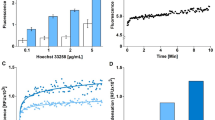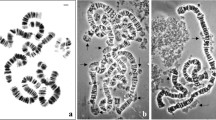Abstract
SYNCYTIAL nuclei, following isolation and staining by Feulgen's reaction, form an irregular pattern consisting of clumps, with single nuclei scattered in between. It is possible to estimate the deoxyribonucleic acid (DNA) content of single syncytial nuclei by microspectrophotometry, but not those in clumps, due to overlapping and lack of definity. It was considered that proteolytic enzymes could break up the clumps, but it was not known whether they would also damage the nuclei. In this investigation, papain and trypsin were used to break up the clumps, and their effect observed on nuclear size, shape and DNA content.
This is a preview of subscription content, access via your institution
Access options
Subscribe to this journal
Receive 51 print issues and online access
$199.00 per year
only $3.90 per issue
Buy this article
- Purchase on Springer Link
- Instant access to full article PDF
Prices may be subject to local taxes which are calculated during checkout
Similar content being viewed by others
References
Quinlivan, W. L. G., Amer. J. Obstet and Gynec., 84, 8, 1065 (1962).
Author information
Authors and Affiliations
Rights and permissions
About this article
Cite this article
QUINLIVAN, W. Deoxyribonucleic Acid Content of Syncytial Nuclei treated with Papain and Trypsin. Nature 196, 694–695 (1962). https://doi.org/10.1038/196694b0
Issue Date:
DOI: https://doi.org/10.1038/196694b0
Comments
By submitting a comment you agree to abide by our Terms and Community Guidelines. If you find something abusive or that does not comply with our terms or guidelines please flag it as inappropriate.



